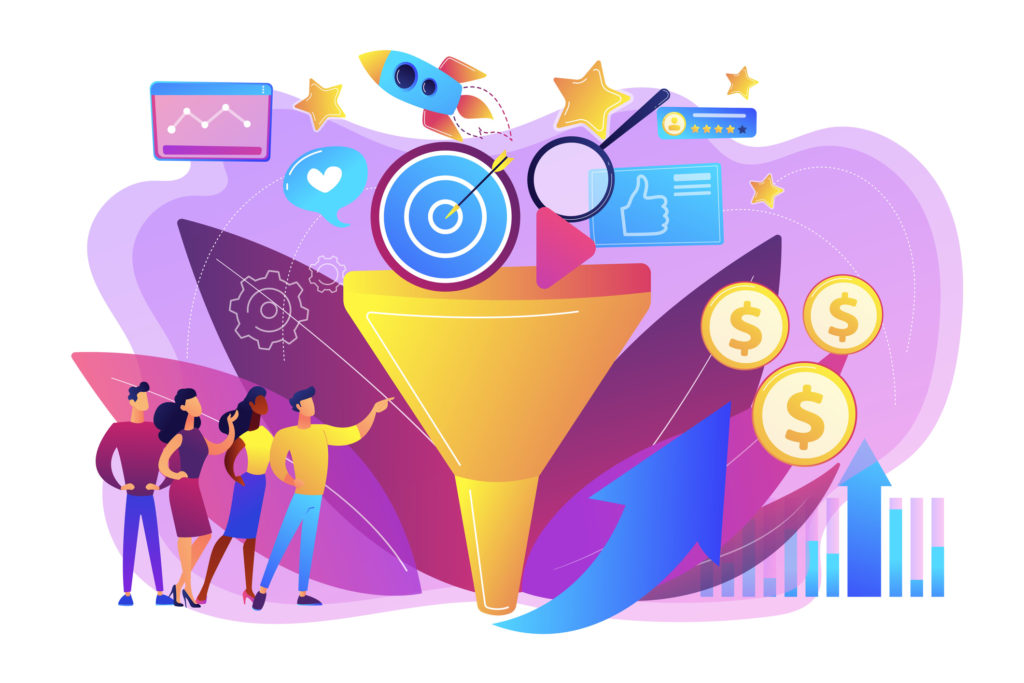When your business has an effective inbound marketing strategy, your website becomes part of the sales team. While your website can’t have a conversation with a potential client, it can use the same strategies a salesperson would use to convert visitors into leads.
Like a salesperson, your website must be designed to convince visitors that your law firm has what they need. Potential clients may be anywhere along the buyer’s journey when they discover your website. They might still be learning about their problem, or they could already be looking for an attorney.
It’s important to convert clients when they visit your website and convince them to call your office or fill out the submission form. Even if you provide visitors with a lot of useful information about their problem, if you don’t convert them, they probably won’t return to your site.
What Is the Buyer’s Journey?
The buyer’s journey is the process a customer goes through to get to the point of being ready to accept your services. Digital marketers often refer to the buyer’s journey as the marketing funnel.
The four stages of the buyer’s journey are Awareness, Interest, Desire, and Action (AIDA).
Your interaction with a potential client begins when they are directed to your website in one of the following ways:
- Referrals
- Pay-per-click advertising
- Social media
- Organic traffic
Content Marketing Converts Visitors Into Leads
Organic traffic refers to people who find your website from a Google query. To attract organic traffic, your digital marketer will create engaging and authoritative content on subjects related to your services. This content will guide visitors along the customer journey using topics such as:
- What is road rash?
- Do I have to take the insurance company’s first offer?
- Does a truck have a black box?
- What are the penalties for a third DUI in Maryland?
- Who gets to keep the house in a divorce?
- How do I change my will?
Stage 1: Awareness
At the Awareness stage, the buyer knows they have a problem but aren’t sure if they need an attorney. For example, maybe a loose railing caused someone to fall down a flight of stairs, but they don’t know what to do next. At this point, a person may find an article on your site called “Can I Sue My Landlord for Refusing to Make Repairs?”
Some visitors will call your office after reading just one page. Others will be propelled along the buyer’s journey by well-placed internal links.
To address the concerns of visitors in the Awareness stage, you’ll want to make sure your website does the following:
- Grabs the reader’s attention
- Is optimized for mobile users
- Has contact information
- Provides useful information about their problem
- Includes content that answers specific questions visitors are asking
- Demonstrate empathy and professionalism
- Convinces visitors they’ve come to the right place
Stage 2: Interest
During the Interest stage, a visitor will become convinced that they need an attorney. As you continue to engage and inform the reader about their situation, their trust in you will grow.
Perhaps the visitor was injured in an accident caused by a big rig truck, and they were thinking about taking the initial insurance offer. They then find a blog post on your site titled “The Long-term Costs of Truck Accident Injuries.” This article may prompt the reader to pick up the phone and call your office or encourage them to learn more about your firm and the services you offer.
To address the concerns of visitors who are in the Interest stage, your website should:
- Sustain the reader’s interest and attention
- Provide contact information
- Persuade the reader that you know how to solve their problem
- Provide testimonials from people you have helped
- Have an attractive logo
Stage 3: Desire
When they’ve reached the Desire stage, visitors already know they require an attorney, so it’s time to convince them to choose you.
To convert visitors in the Desire stage, your website should include the following features:
- An About Us page
- Case studies
- Testimonials from satisfied clients
- Social proof
- Contact information and submissions forms
Stage 4: Action
Converting clients isn’t always a linear process. A visitor may decide to contact your firm at any point in the buyer’s journey. That’s why calls-to-action, submission forms, and your phone number must appear throughout your website.
Building a Website That Works for You
The website built for you by SLS Consulting, Inc. is sure to convert clients. In fact, our conversion rate is five to seven percent. That’s much higher than the industry average of only two to three percent.
Contact SLS Consulting, Inc. to schedule a FREE consultation today by calling (323) 254-1510.
Categories:
- Ask SLS
- Bail Bonds
- Client-Focused Strategy
- Community
- Google My Business
- Google Updates
- Holidays and Other Fun Stuff
- Law Firm Management
- Legal Online Marketing
- Local Search
- Marketing Tips
- Ms. White Hat’s SEO Corner
- Online Brand Development
- Online Content Development
- Online Review Sites
- Search Engine Optimization
- SLS News
- Social Media Marketing
- Video Marketing
- Website Design